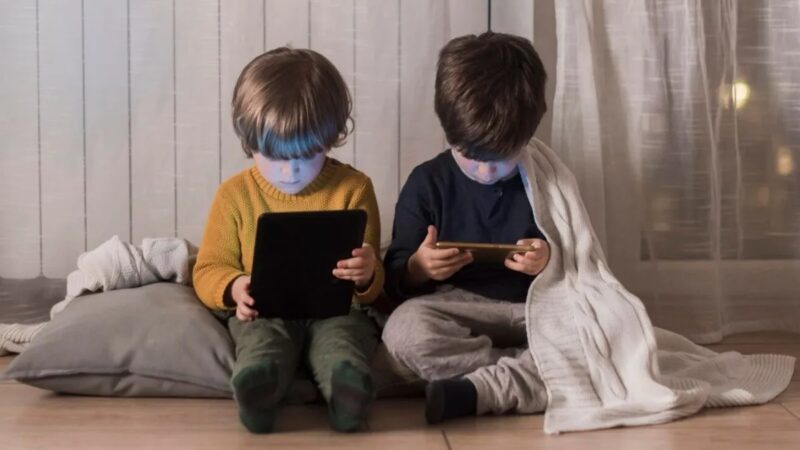
The rapid digitalisation of education and entertainment has brought convenience but also significant challenges, especially for children. A recent study conducted by the Internet and Mobile Association of India (IAMAI) and shared by the National Council of Educational Research and Training (NCERT) with CBSE schools has revealed deeply worrying trends about screen addiction among young students in Bihar. The report highlights that children as young as five are showing high levels of dependency on digital devices, raising concerns about mental health, behaviour, and long-term social development.
Rising Digital Dependency Among Young Learners
In a world where screens have become an integral part of everyday life, the report paints a troubling picture of how digital devices are dominating childhood. According to the IAMAI data, nearly 37 percent of children aged between 5 and 7 years and 49 percent of those aged 8 to 11 in CBSE-affiliated schools across Muzaffarpur own tablets or smartphones. This level of early exposure to technology has led to growing concerns about digital addiction, online safety, and the decline of physical and social engagement.
The report reveals that 66 percent of children aged 8 to 11 play online games regularly, while 12 percent of them access websites that are inappropriate for their age group. Such behaviour, when left unchecked, could potentially lead to severe issues such as decreased concentration, poor academic performance, and exposure to online risks including cyberbullying and grooming.
The Alarming Statistics Behind the Report
One of the most concerning findings of the IAMAI report is the amount of time children are spending on gaming and online platforms. Among children aged 5 to 7, around 62 percent reportedly play online games for more than six hours every week. This figure escalates to 79 percent among 8–11-year-olds, a number that indicates a growing digital dependency during formative years.
What is even more worrying is that 45 percent of children in the 8–11 age group admitted to sleeping with their mobile phones beside them. This habit not only disrupts sleep patterns but also encourages unhealthy screen use late at night. Experts believe such behaviour can have long-term effects on emotional regulation, brain development, and attention span.
CBSE and NCERT Take Preventive Steps
The disturbing trends revealed in the IAMAI report have prompted NCERT and the Central Board of Secondary Education (CBSE) to take immediate action. The findings have been shared with schools to help them design awareness campaigns and workshops that promote healthy digital practices among students and parents.
CBSE has issued a set of guidelines recommending that schools organise sessions on cybersecurity, responsible internet use, and screen-time management. The advisory also urges parents to monitor their children’s online behaviour closely and maintain open communication about digital safety. The board has emphasised that parents should avoid sharing passwords or financial information with children and educate them about potential online threats, including grooming, identity theft, and cyberbullying.
New Cybersecurity and Screen-Time Guidelines
The new guidelines introduced by CBSE and NCERT aim to help children develop responsible and safe digital habits. Parents have been encouraged to create a structured schedule for device usage, ensuring that children spend limited time on screens each day. They are also advised to keep mobile phones and tablets away during mealtimes and bedtime.
Schools have been instructed to implement regular awareness programs for both students and teachers, focusing on online safety, cyber hygiene, and the psychological effects of excessive screen time. Teachers are being encouraged to incorporate digital literacy into classroom discussions and to guide children on how to differentiate between safe and unsafe online spaces.
Furthermore, the CBSE advisory includes steps to encourage physical activities, hobbies, and interpersonal interactions among students, which can help reduce their reliance on virtual entertainment.
Experts Warn of Long-Term Consequences
Cybersecurity experts and child psychologists have voiced serious concerns about the impact of prolonged screen exposure on young minds. They warn that overuse of digital devices at an early age can interfere with the natural development of social and cognitive skills. Children who spend too much time online often struggle with reduced attention spans, emotional instability, and even addictive behaviour.
Experts also highlight that online games and social media platforms are designed to capture attention through constant engagement. This can lead to dopamine-driven habits, making it harder for children to disconnect from devices. Over time, such patterns can cause anxiety, irritability, and disrupted sleep cycles.
Pediatric specialists have further pointed out that excessive screen time may affect physical health as well, leading to posture-related issues, vision strain, and lack of physical activity. These problems, if not addressed early, can contribute to long-term developmental delays.
The Situation in Bihar’s Schools
Bihar, like many other states, has witnessed a massive digital shift in education since the COVID-19 pandemic. The rapid adaptation of online learning tools and virtual classrooms has exposed children to screens for long hours every day. While digital education has undoubtedly expanded learning opportunities, it has also blurred the boundaries between healthy and excessive screen use.
In Muzaffarpur and other urban districts, the growing trend of children owning tablets and smartphones has created a double-edged sword. On one hand, it gives them access to knowledge and global connectivity; on the other, it increases the risk of isolation, digital fatigue, and exposure to online threats.
Teachers across Bihar have noticed behavioural changes in students who spend more time online. Many children show signs of impatience, distraction, and reduced interest in outdoor activities. This digital dependency has also affected their communication skills and concentration levels in classrooms.
Schools and Parents Need to Work Together
Education experts suggest that the solution lies in a joint effort between schools, parents, and policymakers. Schools must play an active role in promoting digital well-being by including lessons on cyber safety and balanced screen use in their curriculum. Regular counselling sessions for students and parents can help in identifying early signs of screen addiction.
Parents, on the other hand, should set practical rules for screen use at home. Limiting device time, encouraging outdoor play, and engaging in family conversations are essential steps to break the digital dependency cycle. Experts also advise that parents act as role models by following the same digital discipline they expect from their children.
CBSE has also suggested that parents create tech-free zones at home — especially in bedrooms and dining areas — to ensure children don’t carry screens everywhere. Engaging children in creative hobbies like reading, drawing, or sports can help them rediscover the joy of offline experiences.
The Role of Awareness and Education
Awareness remains the most powerful tool in combating digital addiction. The IAMAI report has urged both schools and the government to launch digital literacy campaigns that focus on safe internet usage among children. Training sessions for teachers on identifying the signs of addiction and online grooming are also recommended.
Experts stress that technology itself is not the enemy, but how it’s used determines its impact. Digital education, when guided properly, can be a source of immense learning. The key is moderation, supervision, and understanding the psychological needs of children.
Policy Recommendations and the Way Forward
The IAMAI report has called for a multi-level policy intervention to address the growing challenge of screen dependency. Educational boards, parents, and digital platforms must work together to create a safe online environment for children.
The report recommends that schools integrate digital well-being modules into the academic curriculum. These modules would teach students about online ethics, privacy, and the importance of balancing screen time. Simultaneously, digital platforms and gaming companies should be held accountable for providing parental control features and strict content filters.
Authorities are also being urged to invest in community-level awareness programs. Such initiatives would reach rural and semi-urban families, where digital awareness remains limited despite increasing smartphone penetration.
Balancing Technology and Childhood
While technology is an inseparable part of modern life, it should enhance a child’s growth, not hinder it. Experts advise that the focus should be on creating healthy digital habits rather than imposing total restrictions. Scheduled screen breaks, supervised gaming, and offline family time can bring about significant improvement in digital behaviour.
The IAMAI and NCERT findings serve as a wake-up call for Bihar and other states witnessing similar trends. The goal is not to eliminate technology from children’s lives but to ensure it’s used wisely, safely, and in moderation.
The IAMAI report on children’s screen addiction has revealed a growing problem that demands urgent attention from parents, schools, and society. In Bihar, where digital exposure is increasing rapidly, there is a pressing need to cultivate awareness about responsible technology use.
CBSE’s proactive approach in issuing new guidelines is a crucial step in addressing this concern. However, true change will depend on consistent efforts from families, educators, and policymakers to ensure that children enjoy a balanced relationship with technology.
As the digital world continues to expand, the responsibility of guiding the next generation toward safe and healthy digital habits becomes more critical than ever.


